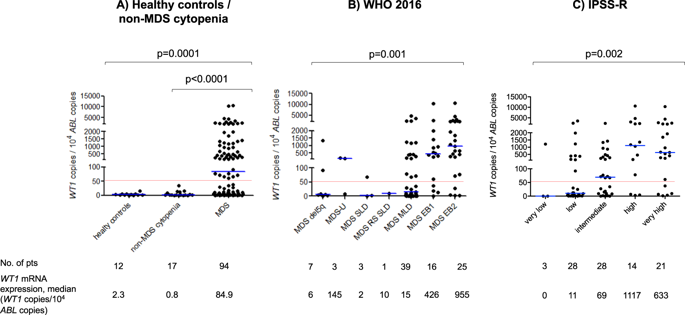当前位置:
X-MOL 学术
›
Blood Cancer J.
›
论文详情
Our official English website, www.x-mol.net, welcomes your feedback! (Note: you will need to create a separate account there.)
Prognostic impact of peripheral blood WT1-mRNA expression in patients with MDS.
Blood Cancer Journal ( IF 12.8 ) Pub Date : 2019-11-12 , DOI: 10.1038/s41408-019-0248-y Christina Rautenberg 1 , Ulrich Germing 1 , Sabrina Pechtel 1 , Marius Lamers 1 , Carolin Fischermanns 1 , Paul Jäger 1 , Stefanie Geyh 1 , Rainer Haas 1 , Guido Kobbe 1 , Thomas Schroeder 1
Blood Cancer Journal ( IF 12.8 ) Pub Date : 2019-11-12 , DOI: 10.1038/s41408-019-0248-y Christina Rautenberg 1 , Ulrich Germing 1 , Sabrina Pechtel 1 , Marius Lamers 1 , Carolin Fischermanns 1 , Paul Jäger 1 , Stefanie Geyh 1 , Rainer Haas 1 , Guido Kobbe 1 , Thomas Schroeder 1
Affiliation

|
Few reports suggested a prognostic impact of Wilms'Tumor-1 (WT1)-mRNA overexpression in MDS, but translation into clinical routine was hampered by limited patients numbers, differing sample sources, non-standardized methods/cut-offs. To evaluate whether WT1-mRNA expression yields additional prognostic information, we measured peripheral blood (PB) WT1-mRNA expression in 94 MDS using a standardized assay offering a validated cut-off to discriminate between normal and WT1-mRNA overexpression. Overall, 54 patients (57%) showed WT1-mRNA overexpression, while 40 patients (43%) had normal WT1-mRNA expression. This enabled discrimination between MDS and both healthy controls and non-MDS cytopenias. Furthermore, WT1-mRNA expression correlated with WHO 2016 subcategories and IPSS-R as indicated by mean WT1-mRNA expression and frequency of WT1-mRNA overexpressing patients within respective subgroups. Regarding the entire group, PB WT1-mRNA expression was associated with prognosis, as those patients showing WT1-mRNA overexpression had higher risk for disease progression and AML transformation and accordingly shorter progression-free, leukemia-free and overall survival in univariate analysis. In multivariate analysis, prognostic impact of PB WT1-mRNA expression status was independent of IPSS-R and enabled more precise prediction of PFS, but not OS, within IPSS-R very low/low and intermediate risk groups. Overall, measuring PB WT1-mRNA appears valuable to support diagnostics and refine prognostication provided by the IPSS-R.
中文翻译:

MDS 患者外周血 WT1-mRNA 表达对预后的影响。
很少有报告表明 Wilms'Tumor-1 (WT1)-mRNA 过度表达对 MDS 的预后有影响,但由于患者数量有限、样本来源不同、非标准化方法/截止值,转化为临床常规受到阻碍。为了评估 WT1-mRNA 表达是否产生额外的预后信息,我们使用标准化测定法测量了 94 MDS 中的外周血 (PB) WT1-mRNA 表达,该测定提供了经过验证的临界值,以区分正常和 WT1-mRNA 过表达。总体而言,54 名患者 (57%) 显示 WT1-mRNA 过度表达,而 40 名患者 (43%) WT1-mRNA 表达正常。这使得 MDS 与健康对照和非 MDS 血细胞减少症之间能够进行区分。此外,WT1-mRNA 表达与 WHO 2016 亚类和 IPSS-R 相关,如各个亚组内 WT1-mRNA 过表达患者的平均 WT1-mRNA 表达和频率所示。就整个组而言,PB WT1-mRNA 表达与预后相关,因为单变量分析显示,WT1-mRNA 过度表达的患者疾病进展和 AML 转化的风险较高,因此无进展生存期、无白血病生存期和总生存期较短。在多变量分析中,PB WT1-mRNA 表达状态的预后影响独立于 IPSS-R,并且能够在 IPSS-R 极低/低和中风险组内更精确地预测 PFS,但不能预测 OS。总体而言,测量 PB WT1-mRNA 对于支持IPSS-R 提供的诊断和完善预测似乎很有价值。
更新日期:2019-11-13
中文翻译:

MDS 患者外周血 WT1-mRNA 表达对预后的影响。
很少有报告表明 Wilms'Tumor-1 (WT1)-mRNA 过度表达对 MDS 的预后有影响,但由于患者数量有限、样本来源不同、非标准化方法/截止值,转化为临床常规受到阻碍。为了评估 WT1-mRNA 表达是否产生额外的预后信息,我们使用标准化测定法测量了 94 MDS 中的外周血 (PB) WT1-mRNA 表达,该测定提供了经过验证的临界值,以区分正常和 WT1-mRNA 过表达。总体而言,54 名患者 (57%) 显示 WT1-mRNA 过度表达,而 40 名患者 (43%) WT1-mRNA 表达正常。这使得 MDS 与健康对照和非 MDS 血细胞减少症之间能够进行区分。此外,WT1-mRNA 表达与 WHO 2016 亚类和 IPSS-R 相关,如各个亚组内 WT1-mRNA 过表达患者的平均 WT1-mRNA 表达和频率所示。就整个组而言,PB WT1-mRNA 表达与预后相关,因为单变量分析显示,WT1-mRNA 过度表达的患者疾病进展和 AML 转化的风险较高,因此无进展生存期、无白血病生存期和总生存期较短。在多变量分析中,PB WT1-mRNA 表达状态的预后影响独立于 IPSS-R,并且能够在 IPSS-R 极低/低和中风险组内更精确地预测 PFS,但不能预测 OS。总体而言,测量 PB WT1-mRNA 对于支持IPSS-R 提供的诊断和完善预测似乎很有价值。


























 京公网安备 11010802027423号
京公网安备 11010802027423号